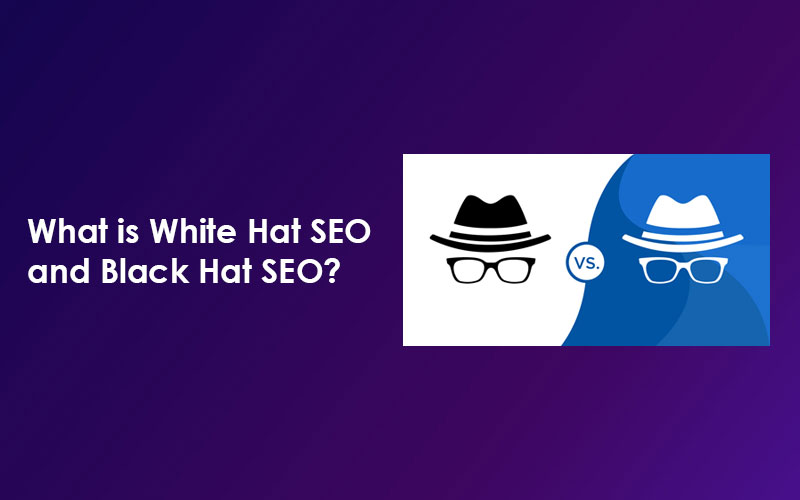In the expansive realm of the internet, where approximately 8.5 billion searches are conducted daily, search engine optimization (SEO) has emerged as a formidable tool for establishing dominance in the digital landscape. Website owners aim to attain top rankings on search engine result pages (SERPs) to attract organic traffic.
Yet, within this quest for online triumph, a dichotomy arises – a clash between two distinct approaches: White Hat SEO and Black Hat SEO. Grasping the genuine nature and implications of these strategies is vital for navigating this digital battlefield and making well-informed choices.
White Hat SEO: Building a Solid Foundation
Ethics, integrity, and long-term sustainability are the cornerstones of White Hat SEO. Unlike its shady counterpart, White Hat SEO focuses on following the rules and adhering to ethical practices. It is the path of righteousness in the digital realm, where website owners prioritize user experience and quality content creation.
At the heart of White Hat SEO lies a deep understanding of the importance of user experience. Websites employing White Hat techniques strive to deliver valuable, relevant, and engaging content to their visitors. By putting the needs and interests of users first, they create a virtuous cycle of trust and loyalty.
Another key principle of White Hat SEO is its commitment to adhering to search engine guidelines. It recognizes that search engines play a crucial role in determining the visibility and ranking of websites. White Hat practitioners diligently study and follow these guidelines to ensure their websites meet the standards set by search engines.
Techniques and Best Practices of White Hat SEO
White Hat SEO encompasses a range of techniques and best practices that aim to optimize websites ethically and responsibly. These strategies focus on delivering user value while adhering to search engine guidelines, resulting in sustainable growth and improved rankings.
1. Keyword Research and Optimization
Strategic keyword research and optimization form the foundation of White Hat SEO. By identifying relevant keywords that align with the website’s content and target audience, website owners can optimize their pages to attract organic traffic.
2. On-page Optimization
On-page optimization is another crucial aspect of White Hat SEO. It involves optimizing meta tags, including meta titles and descriptions, headers, URLs, and alt tags for images. These optimizations provide search engines with valuable information about the content, helping improve visibility and click-through rates.
3. Quality Content Creation and Regular Updates
Creating high-quality content and regularly updating it is an essential practice in White Hat SEO. Valuable and relevant content attracts and engages users and encourages them to share and link to the website.
4. Natural Link Building and Earning Backlinks
White Hat SEO emphasizes the importance of natural link building and earning backlinks from reputable sources. Instead of resorting to buying or spamming links, website owners focus on creating compelling content that naturally attracts links from other websites. These earned backlinks contribute to the website’s authority and credibility, positively impacting search engine rankings.
5. Responsive Website Design and Mobile Optimization
Responsive website design and mobile optimization are critical aspects of White Hat SEO. With the increasing use of mobile devices, search engines prioritize mobile-friendly websites. Ensuring a seamless user experience across different devices satisfies search engine requirements and enhances user engagement and satisfaction.
6. Proper Site Structure and Navigation
A well-organized website structure enables search engines to crawl and index pages effectively. Clear navigation helps users find the information they need easily, improving user experience and reducing bounce rates.
Benefits and Long-Term Results of White Hat SEO
White Hat SEO offers a multitude of benefits and long-term results that go beyond immediate gains. One of the primary benefits of White Hat SEO is improved search engine rankings. Websites can climb the search engine result pages by optimizing website content, implementing proper on-page SEO techniques, and earning high-quality backlinks (SERPs).
White Hat SEO also contributes to enhancing website authority and credibility. This helps establishes the website as a reliable source of information in its industry, fostering long-term relationships with the audience.
Sustainable organic traffic growth is another significant benefit of White Hat SEO. As a result of higher search engine rankings, websites attract a steady stream of organic traffic over time. Unlike paid advertisements or temporary tactics, organic traffic is a long-lasting source of visitors who are genuinely interested in the website’s content, products, or services.
One of the significant advantages of White Hat SEO is the reduced risk of penalties or search engine bans. By adhering to ethical practices and following search engine guidelines, websites minimize the chances of incurring penalties that could negatively impact their rankings or even result in removal from search engine indexes.
Black Hat SEO: The Tempting Shortcut
Black Hat SEO represents the dark side of the digital realm, where unethical and manipulative practices are employed to gain an unfair advantage in search engine rankings. It is a path fraught with risks and short-term gains, using deceptive techniques that exploit vulnerabilities in search engine algorithms.
At its core, Black Hat SEO relies on methods that violate search engine guidelines and manipulate the system for quick rankings. Keyword stuffing, the excessive and unnatural use of keywords, is a common tactic used to deceive search engines into considering a website is more relevant than it actually is. This practice often results in poor user experience and low-quality content.
However, it is essential to note that engaging in Black Hat SEO poses severe consequences. Search engines continuously update their algorithms to identify and penalize unethical websites. These penalties can range from decreased rankings to complete removal from search engine indexes, resulting in a substantial loss of organic visibility and potential damage to the website’s reputation.
Techniques and Risks of Black Hat SEO
Black Hat SEO employs a range of unethical techniques that violate search engine guidelines and manipulate the system for immediate gains.
1. Keyword Stuffing and Content Spamming
Keyword stuffing and content spamming are commonly used techniques in Black Hat SEO. Website owners overload their content with excessive and irrelevant keywords in an attempt to manipulate search engine rankings. This practice not only diminishes the quality and readability of the content but also misleads search engines and compromises the user experience.
2. Hidden Text and Cloaking
Hidden text and cloaking are deceptive methods used in Black Hat SEO. Website owners hide text or links on their pages by using font colors that match the background or placing them in hidden HTML elements. This technique aims to manipulate search engine algorithms while providing users with a different, often irrelevant, content experience.
3. Link Farming and Buying Low-Quality Backlinks
Link farming and the purchase of low-quality backlinks are prevalent tactics employed by Black Hat SEO practitioners. They artificially generate a large number of links from low-quality or unrelated websites to manipulate search engine rankings.
4. Automated Content Generation and Scraping
Automated content generation and scraping involve the use of software to create or copy content from other websites without permission. This unethical practice aims to populate websites with large amounts of content quickly. However, it compromises the uniqueness and quality of the content, potentially resulting in penalties and copyright infringement issues.
5. Doorway Pages and Sneaky Redirects
Black Hat SEO utilizes doorway pages and sneaky redirects to manipulate search engine rankings. Doorway pages are created solely for search engines, optimized to rank high in search results, and then redirect users to a different page. These tactics deceive search engines and users, leading to poor user experiences and violations of search engine guidelines.
6. Negative SEO Tactics
Negative SEO tactics are malicious actions taken against competitors’ websites to undermine their search engine rankings. These tactics may include creating spammy backlinks, spreading false information, or hacking websites.
Consequences and Penalties of Black Hat SEO
Engaging in Black Hat SEO comes with severe consequences and penalties that can have long-lasting effects on a website’s visibility, reputation, and overall success.
Black Hat SEO carries the inherent risk of incurring penalties from search engines through algorithm updates. When websites are found to be in violation of search engine guidelines, they may incur penalties, leading to a loss of rankings and decreased visibility in search results.
The loss of rankings and organic visibility is a significant blow to websites involved in Black Hat SEO. As search engines detect and penalize these unethical practices, websites may experience a sudden drop in their search engine rankings. Consequently, they lose the organic traffic that is crucial for sustainable growth and online success.
Engaging in Black Hat SEO can severely damage a website’s reputation and brand image.
The most severe consequence of Black Hat SEO is the potential blacklisting or removal from search engine indexes. Repeat offenders or those involved in particularly egregious practices may face severe penalties, including being completely removed from search engine results.
White Hat SEO vs. Black Hat SEO: The Difference
Several key factors distinguish white Hat SEO and Black Hat SEO. Firstly, White Hat SEO is characterized by ethical practices prioritizing the user’s experience and delivering valuable, relevant content. It follows search engine guidelines and aims to build long-term sustainability, establishing a positive reputation and credibility for the website.
In contrast, Black Hat SEO relies on manipulative tactics that are primarily focused on tricking search engine algorithms for short-term gains. It lacks ethical considerations and often leads to negative consequences, such as penalties, loss of rankings, and damage to the website’s reputation.
Secondly, White Hat SEO emphasizes the importance of long-term sustainability. It aims to establish a strong online presence by employing strategies that stand the test of time. This approach prioritizes organic growth, quality content, and genuine user engagement.
Conversely, Black Hat SEO seeks quick results and immediate gains without considering the long-term impact. It often resorts to shortcuts and deceptive techniques that may provide temporary benefits but carry significant risks, including penalties, loss of credibility, and potential blacklisting by search engines.
Conclusion
Understanding the fundamental concept of what is White Hat SEO and Black Hat SEO is essential for any website owner or digital marketer. While Black Hat SEO may seem tempting with its promise of quick results, it is crucial to prioritize ethical practices and long-term sustainability with White Hat SEO.
To harness the power of White Hat SEO and optimize your website for enduring success, we invite you to partner with our agency. By working with us, you can rest assured that your website will ascend in search engine rankings, cultivate a positive reputation, and forge meaningful connections with your target audience.





